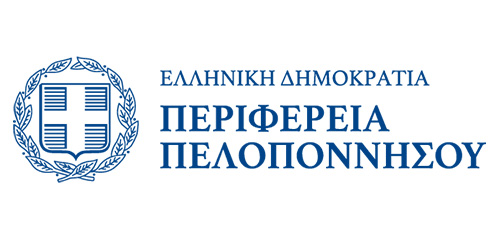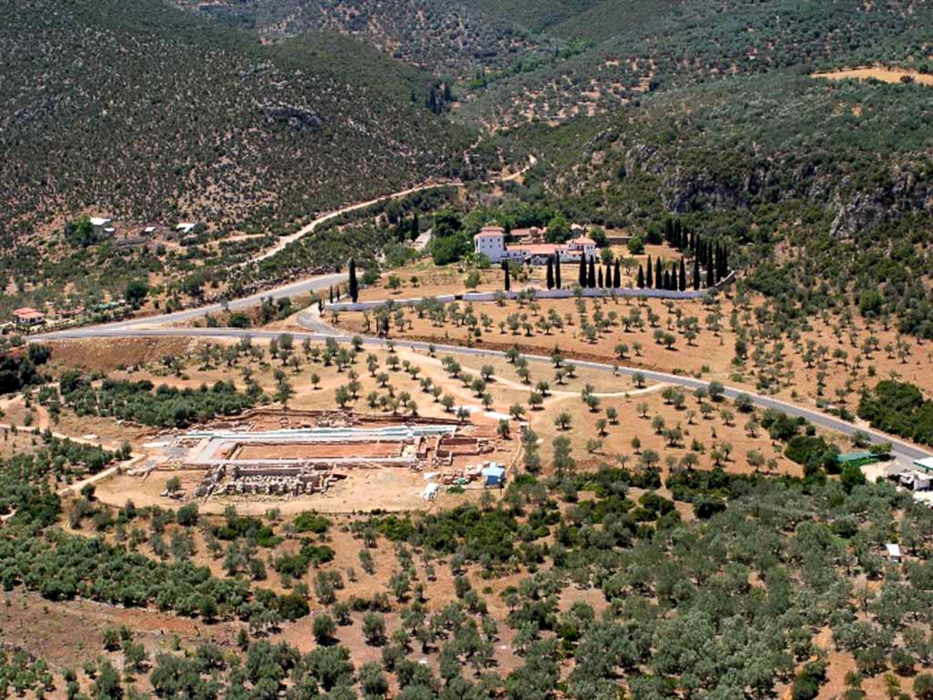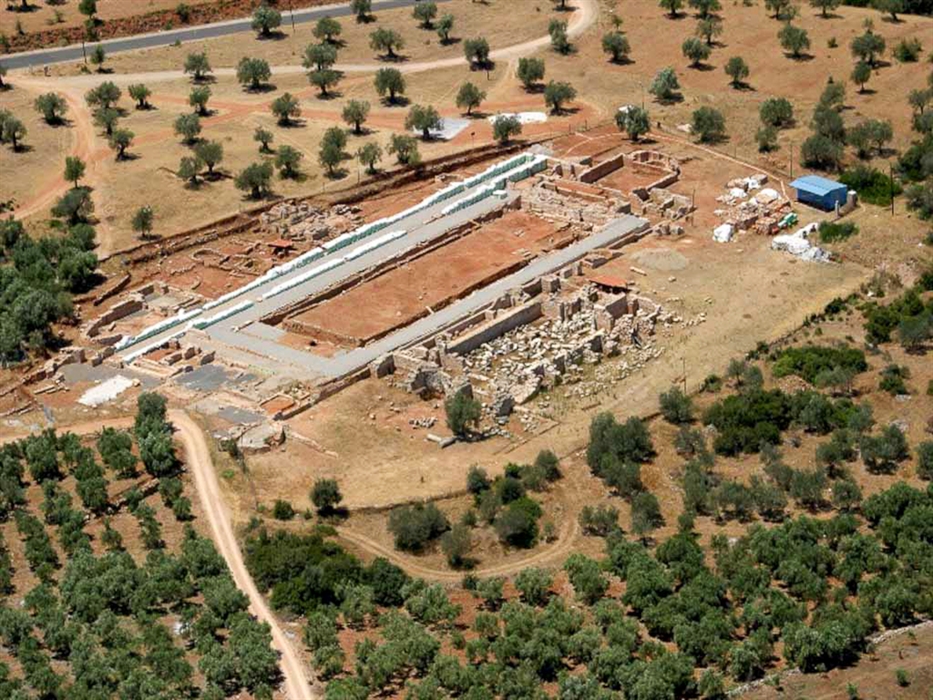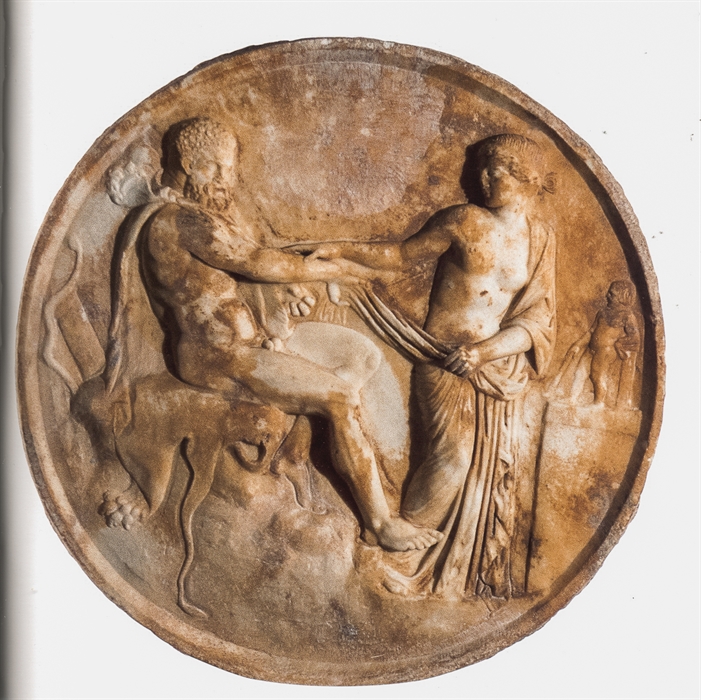The Villa of Herodes Atticus
Discover the ruins of this amazing villa near Loukos Monastery created by Herodes Atticus, a well-respected and well-off figure in 2nd century Greece. It covers 20,000 sq.m. and has some interesting mosaic floors. They are colourful and intricate, with themes such as races in the Hippodrome, the Muses, Rivers and the Labours of Hercules.
Herodes Atticus was a well-respected and well-off figure in 2nd century Greece (for more info see the box below). This prestige and wealth allowed him to have what must have been an absolutely beautiful villa in its time. The villa covers an amazing 20,000 sq.m opposite the Loukos Monastery, and has some interesting mosaic floors in the passages around the courtyard. They are colourful and intricate, with themes such as races in the Hippodrome, the Muses, Rivers and the Labours of Hercules.
It seems that Herodes Atticus’ father owned a small villa here in the Eva area. Herodes Atticus greatly expanded and remodelled this into a luxurious villa. It fact, it may have been modelled on Hadrian's mansion in Tivoli, Italy. It is also probable that the Emperor Hadrian visited the area around 130/1 AD and gave Herodes permission to expand the villa.
Herodes Atticus created a beautiful villa with gardens, sculptures and tributes in honour of his family and other loved ones. It seems as if others continued this process as excavations have brought buildings from various phases to light - the most recent being from the 5th century and the earliest from Herodes’ time in the 2nd century AD.
Somewhat unusually, the first excavations on the site were done by the monks from the Loukos monastery across the road! After the Greek War of Independence in 1821, the monks found sculptures and columns etc which they collected up and displayed in the monastery courtyard, where many of them still are to this day. More official excavation work has been undertaken by various archaeologists including Theodoros Spyropoulos who in 2016 stated: "The magnificent complex was the largest Roman monument in Greece. Once the necessary restoration works are finished, when visitors enter the site they will get an idea of what villas were like in Herodes' time. This is important as it brings to life his multifaceted personality that represented two worlds, the Greek and the Roman." Many of the sculptures unearthed were eventually transferred to the National Archaeological Museum of Athens and museums in Berlin.
A few words about Herodes Atticus
His full name was Lucius Violus Hipparchus Tiberius Claudius Atticus Herodes! He was a prominent personality in the 2nd century - a well-known patron, a keen orator, knowledgeable about philosophy and politics, and a prolific writer. And in a way, he still has a strong presence in Athens right up to this day. Modern-day Athenians go to concerts in the “Irodeio”, the wonderful theatre he funded at the foot of the Acropolis, and take their kids to see the guards changing outside the Presidential Palace on Irodou Attikou, one of the best-known and most sought-after streets in the city. So even after nearly 2000 years his name is still on the tongue of Athenians as they go about their everyday business. He is also remembered for renovating the Panathenaic Stadium (140-144).
Herodes Atticus held high offices in Athens and Asia Minor and made his career in the cities of the eastern Mediterranean. In fact, in recognition of his friendship and favour, the Emperor Hadrian appointed him as a consul in 143. So it’s not surprising that this wasn’t Herodes’ only villa: He also had one in Marathon and another in Kifissia, just north of Athens.
Did you know that
The Villa is 4 km from Astros.
The ancient village of Eva was very prosperous in the 2nd century but was probably destroyed by Herouls in raids around 269.
Location
Find the destination on the interactive map below.
Categories
Weather
Σχετικό περιεχόμενο χρηστών (UGC)
Ενημερωθείτε για ενδιαφέροντα θέματα γύρω από τον προορισμό μέσα από το περιεχόμενο των χρηστών μας
Discover 7 hidden gems of the Peloponnese
Many of you may have already visited some of the most renowned attractions…
TOP 10 archaeological museums in the Peloponnese
Olympia, Mycenae, Epidaurus, Diros Cave, Ancient Corinth, Messene and…
TOP 10 Castles in the Peloponnese
Castles galore! Mystras, Monemvasia, Palamidi, Methoni, Koroni,…
Newsletters
- About us
- FAQ's
- Map
- Tourism information centers
- Disclaimer
- Sitemap
- Our brand
- Media roum
- Adding your bussiness
- Corporate
- MICE

Peloponnese. Greece beyond the obvious





Design and creation from Cosmote
Marinas and Moorings
Diving centers
Get inspired
- Media gallery
- Blog
- The Peloponnese in the media
- Your feedback
- Users' general content
- Users' local products
- Users' events content
- Ask a local
More
- Accommodation
- Travel agencies
- Restaurants
- Services
- Destinations Map
- Weather
- Public transport
- Events
- Frequently asked questions
- Useful phones
- B2B
- Destination Data
- Contact



